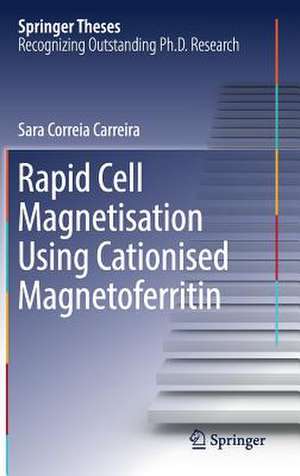Rapid Cell Magnetisation Using Cationised Magnetoferritin: Springer Theses
Autor Sara Correia Carreiraen Limba Engleză Hardback – 3 iul 2017
| Toate formatele și edițiile | Preț | Express |
|---|---|---|
| Paperback (1) | 635.01 lei 6-8 săpt. | |
| Springer International Publishing – 4 aug 2018 | 635.01 lei 6-8 săpt. | |
| Hardback (1) | 641.20 lei 6-8 săpt. | |
| Springer International Publishing – 3 iul 2017 | 641.20 lei 6-8 săpt. |
Din seria Springer Theses
- 18%
 Preț: 997.88 lei
Preț: 997.88 lei -
 Preț: 389.88 lei
Preț: 389.88 lei - 15%
 Preț: 646.94 lei
Preț: 646.94 lei - 18%
 Preț: 943.43 lei
Preț: 943.43 lei -
 Preț: 399.29 lei
Preț: 399.29 lei - 18%
 Preț: 944.99 lei
Preț: 944.99 lei - 15%
 Preț: 636.80 lei
Preț: 636.80 lei - 18%
 Preț: 941.05 lei
Preț: 941.05 lei - 15%
 Preț: 643.16 lei
Preț: 643.16 lei - 15%
 Preț: 642.68 lei
Preț: 642.68 lei - 18%
 Preț: 1103.62 lei
Preț: 1103.62 lei - 20%
 Preț: 558.82 lei
Preț: 558.82 lei - 18%
 Preț: 1112.30 lei
Preț: 1112.30 lei - 18%
 Preț: 944.19 lei
Preț: 944.19 lei - 18%
 Preț: 1109.92 lei
Preț: 1109.92 lei - 18%
 Preț: 1217.27 lei
Preț: 1217.27 lei - 15%
 Preț: 640.06 lei
Preț: 640.06 lei - 15%
 Preț: 636.45 lei
Preț: 636.45 lei - 15%
 Preț: 640.06 lei
Preț: 640.06 lei - 15%
 Preț: 640.88 lei
Preț: 640.88 lei -
 Preț: 389.70 lei
Preț: 389.70 lei - 20%
 Preț: 563.89 lei
Preț: 563.89 lei -
 Preț: 393.35 lei
Preț: 393.35 lei - 15%
 Preț: 637.93 lei
Preț: 637.93 lei - 15%
 Preț: 641.85 lei
Preț: 641.85 lei - 18%
 Preț: 1225.94 lei
Preț: 1225.94 lei - 20%
 Preț: 551.36 lei
Preț: 551.36 lei - 18%
 Preț: 1229.10 lei
Preț: 1229.10 lei - 15%
 Preț: 639.25 lei
Preț: 639.25 lei - 18%
 Preț: 999.45 lei
Preț: 999.45 lei - 15%
 Preț: 640.06 lei
Preț: 640.06 lei - 18%
 Preț: 1220.45 lei
Preț: 1220.45 lei - 18%
 Preț: 1116.26 lei
Preț: 1116.26 lei - 18%
 Preț: 1110.72 lei
Preț: 1110.72 lei - 18%
 Preț: 1000.87 lei
Preț: 1000.87 lei - 18%
 Preț: 891.17 lei
Preț: 891.17 lei - 15%
 Preț: 640.06 lei
Preț: 640.06 lei - 5%
 Preț: 1154.07 lei
Preț: 1154.07 lei - 15%
 Preț: 635.96 lei
Preț: 635.96 lei - 15%
 Preț: 640.88 lei
Preț: 640.88 lei -
 Preț: 387.20 lei
Preț: 387.20 lei - 18%
 Preț: 1109.92 lei
Preț: 1109.92 lei -
 Preț: 385.25 lei
Preț: 385.25 lei -
 Preț: 385.25 lei
Preț: 385.25 lei - 18%
 Preț: 1112.30 lei
Preț: 1112.30 lei - 18%
 Preț: 999.45 lei
Preț: 999.45 lei -
 Preț: 386.99 lei
Preț: 386.99 lei - 15%
 Preț: 637.13 lei
Preț: 637.13 lei - 20%
 Preț: 554.20 lei
Preț: 554.20 lei - 20%
 Preț: 555.57 lei
Preț: 555.57 lei
Preț: 641.20 lei
Preț vechi: 754.36 lei
-15% Nou
Puncte Express: 962
Preț estimativ în valută:
122.72€ • 127.64$ • 102.84£
122.72€ • 127.64$ • 102.84£
Carte tipărită la comandă
Livrare economică 13-27 martie
Preluare comenzi: 021 569.72.76
Specificații
ISBN-13: 9783319603322
ISBN-10: 3319603329
Pagini: 165
Ilustrații: XVII, 166 p. 90 illus., 16 illus. in color.
Dimensiuni: 155 x 235 mm
Greutate: 0.44 kg
Ediția:1st ed. 2017
Editura: Springer International Publishing
Colecția Springer
Seria Springer Theses
Locul publicării:Cham, Switzerland
ISBN-10: 3319603329
Pagini: 165
Ilustrații: XVII, 166 p. 90 illus., 16 illus. in color.
Dimensiuni: 155 x 235 mm
Greutate: 0.44 kg
Ediția:1st ed. 2017
Editura: Springer International Publishing
Colecția Springer
Seria Springer Theses
Locul publicării:Cham, Switzerland
Cuprins
Introduction.- Materials and Methods.- Characterising Magnetoferritin and Cationised Magnetoferritin.- Stem Cell Labelling with Cationised Magnetoferritin.- Toxicological Profiling of Cationised Magnetoferritin.- Escherichia coli labelling with Cationised Magnetoferritin.- Overall Conclusions and Future Opportunities.
Textul de pe ultima copertă
Bringing together nanoscience with stem cell and bacterial cell biology, this thesis is truly interdisciplinary in scope. It shows that the creation of superparamagnetic nanoparticles inside a protein coat, followed by chemical functionalisation of the protein surface, provides a novel methodology for cell magnetisation using incubation times as short as one minute. Crucially, stem cell proliferation and multi-lineage differentiation capacity is not impaired after labelling. Due to the unspecific labelling mechanism, this thesis also shows that the same magnetic protein nanoparticles can be used for rapid bacterial magnetisation. Thus, it is possible to magnetically capture and concentrate pathogens from clinical samples quickly and highly efficiently.
Caracteristici
Nominated as an outstanding PhD thesis by the University of Bristol, Bristol, UK Presents a comprehensive introduction to magnetic nanoparticles and their use in magnetic cell labelling Includes a detailed protocol describing the synthesis and functionalisation of novel, protein-based magnetic nanoparticles for ultrafast and universal cell labelling Discusses in-depth the characterisation of magnetic labelling efficiency and the effects on stem cell biology Includes supplementary material: sn.pub/extras
